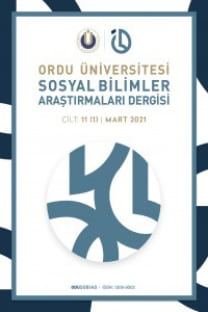ORHAN’DA SAKLI FERİT BEYAZ KALE’DE
Bir “yazılış süreci anlatısı” olan Beyaz Kale’yi, postmodernizmin öne çıkan özellikleri ve kendiliknesnesi aktarımları çerçevesinde yorumlayan bu çalışmada, anlatı kişileri, yazarın aynı zaman içinde farklı iki dönemini anlamlandırması olarak değerlendirilmiş ve İtalyan Köle’nin, Orhan Pamuk; İstanbullu Hoca’nın da Orhan Pamuk’un gençlik yılları yani Ferit Pamuk olarak okunabileceği gösterilmiştir. Orhan Pamuk, Beyaz Kale’deki İtalyan Köle gibi gençliğini suçluluk duygusuyla yüklü bir korkuyla hatırlar. Bu şekilde hatırlamasının altında gençlik yıllarında kendisini hep “bir baltaya sap olamamak” ile suçlayan yakın çevresi, özellikle de annesi vardır. Beyaz Kale anlatısının başında “O zamanlar annesinin, nişanlısının ve dostlarının başka bir adla çağırdıkları başka bir insandım.” diyen anlatıcı gibi Orhan Pamuk da –belki- o zamanlar Ferit adı ile yaşadığı gençliğini sonradan Orhan adını öne çıkaran “yazarlığı”, başarıya ulaşmış, “bir baltaya sap olmuş” hâli ile değiştirme arzusunu somutlaştırmıştır
Anahtar Kelimeler:
Orhan Pamuk, Beyaz Kale, Kendiliknesnesi Aktarımları, Postmodernizm, Anlatı
FERIT HIDDEN IN ORHAN IS IN THE WHITE CASTLE
In the present study that interprets Orhan Pamuk's 'writing process narrative' The White Castle within the frames of the prominent characteristics of postmodernism and self-object transference, narrative persons were evaluated as the author’s interpretation of two separate periods within the same time frame, and it was demonstrated that while the Italian Slave can be read as Orhan Pamuk himself, Istanbulian Hoja can be read as the youth of the author, i.e. Ferit Pamuk. Orhan Pamuk recalls his youth with fear, loaded with a sense of guilt, just as the Italian Slave in The White Castle does. Under this fear lay his close circle and particularly his mother that always blamed him to be useless, or as expressed through a local idiom "having failed at being the handle of an axe". Just as the narrator who states at the beginning of The White Castle's narration “At those times I was a different person, called a different name by his family, fiancé and friends", Orhan Pamuk -maybeobjectifies the desire to replace the youth he lived under the name of Ferit, with his successful "authorship" that puts forward his late name Orhan, or with his self that has "succeeded at being the handle of an axe"
Keywords:
Orhan Pamuk, The White Castle, Selfobject Transference, Postmodernism, Narration,
- ISSN: 1309-9302
- Yayın Aralığı: Yılda 3 Sayı
- Başlangıç: 2010
- Yayıncı: -
Sayıdaki Diğer Makaleler
MARAŞ OLAYLARININ BÜTÜNSEL YAKLAŞIM MODELİ İLE ANALİZİ
ANTİK ÇAĞ CAM YAPIM TEKNİKLERİNİN 3D MODELLEME ÇALIŞMASI İLE YENİDEN ELE ALINMASI
THE DEMAND FOR MORE/PRIVILEGED (THINGS): Leisured Women, Consumption Practices, and Gated Community
Sema YIGIT, Alperen Mustafa YIGIT
TARİHİ KERVAN YOLLARI KAVŞAĞINDA BİR KENT; MİSİS
AVRUPA BİRLİĞİ ORTAK GÜVENLİK VE SAVUNMA POLİTİKASI’NDA İLK ÇATLAK: LİBYA KRİZİ
BANKACI KADINLARIN ÖRGÜTSEL SİNİZMİN ALGILARININ İŞTEN AYRILMA NİYETİNE ETKİSİ: ORDU İLİ ÖRNEĞİ
SİNEMA SEKTÖRÜNDE EMEK SÜRECİ: YÖNETMENLER ÖRNEĞİ
Cemal İYEM, Tamer YALÇIN, Zehra YILDIZ
KADIN YÖNETİCİLERDE İŞ TATMİN DÜZEYLERİNİN ORTA YETİŞKİNLİK DÖNEMİ AÇISINDAN İNCELENMESİ
